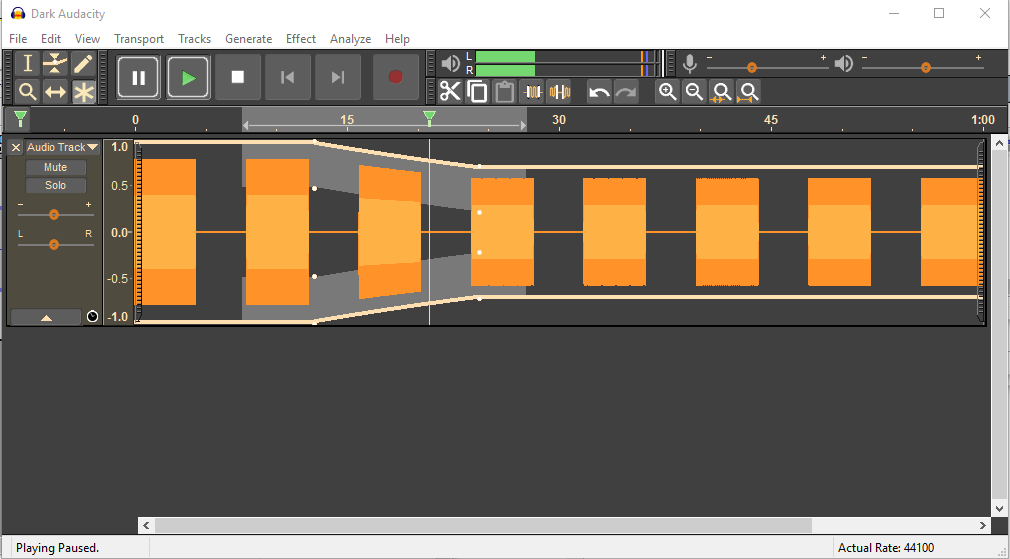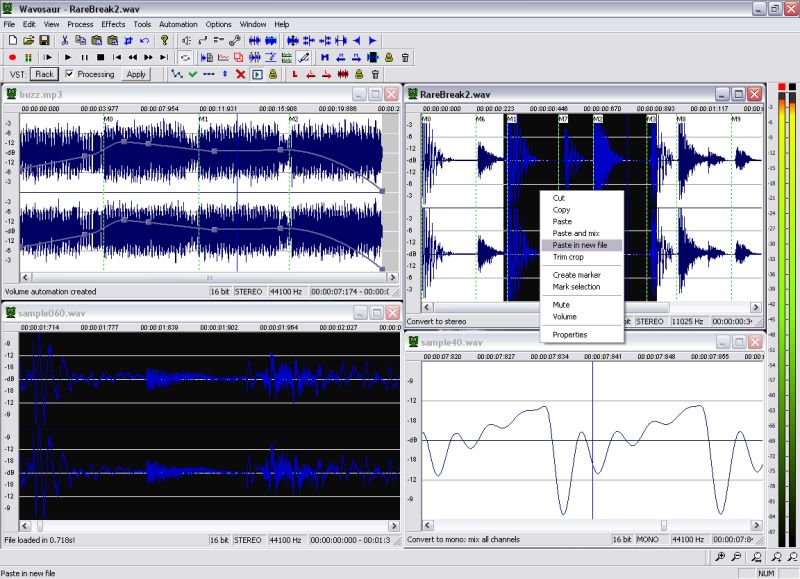There’s been a lot of uproar behind Audacity lately. Find out why and what you can do about it.
People are alternatively outraged or saying that it’s not too big of a deal. You might have seen Audacity called out on your favorite social media groups, or perhaps scrolled past a news headline or two on your feed. But what really happened and what can you do about it?
I’m going to attempt this article without taking positions, laying out both sides for you and letting you make the ultimate choice on whether you want to continue using it or not. I will also attempt to refrain from using puns based off their name.
What is Audacity?
To put it simply: Audacity is a freeware audio editor. Not only is it free, but it’s also equally powerful to a lot of professional and expensive audio editors out there. So powerful, that many professionals even use it for their work on a regular basis. Over the years it has become a trusted brand, though not without controversy.

A screenshot of the freeware audio editor Audacity
The mother company
Recently the Muse Group purchased the software program. The Muse Group is a new brand, but an old company.
In 1998, a Moscow-based dev team led by Eugeny Naidenov created the famous Ultimate Guitar app for the PC. It allowed users to download lyrics and tablature to play their favorite covers. Later, in 2007 they updated the program for smart phones, and have since created a true multinational brand with employees across the globe.
As they expanded, purchasing and creating new brands and services, they decided to make a new umbrella brand, called the Muse Group. It was this newly minted Muse Group that purchased Audacity and triggered the controversy.
Just what happened?
After the Muse Group bought Audacity, they began to quickly stir up controversy. First, they added telemetry, that is, the ability for the program to send back user data to the Muse Group. This is not inherently a malign thing. Google uses telemetry to make sure programs like Chrome work, as well as to refine your searches on their engine in attempt to get you more relevant results. Telemetry, in short, is product feedback.
It absolutely can be malign, though. Never mind the ulterior purposes that Google may have, scores of other companies collect data and sell it off to marketing companies and others (a practice, I might add, that Smartsound will NEVER do).
The user community is naturally and rightfully fed up with companies offering a (usually free) service and selling their data off to the highest bidder. That is, in part, the unfortunate reality behind free services. The company has to make money one way or another, whether that’s through bloatware or shadier practices. So naturally they’re paranoid and skeptical.
Their new CLA
They also updated their Contributor License Agreement, which developers have to sign if they choose to work on the Audacity code. It reads that the Muse Group gets all rights to the written code, which is decidedly against the previous open source spirt of the program.
Audacity’s new privacy policy
Finally, to muddy the issue further, they updated their privacy policy:
Who does Audacity share your Personal Data with?
We may disclose the Personal Data listed above (your hashed IP address) to the following categories of recipients:
- to our staff members. We take precautions to allow access to Personal Data only to those staff members who have a legitimate business need for access and with a contractual prohibition of using the Personal Data for any other purpose.
- to any competent law enforcement body, regulatory, government agency, court or other third party where we believe disclosure is necessary (i) as a matter of applicable law or regulation, or (ii) to exercise, establish or defend our legal rights;
- to our auditors, advisors, legal representatives and similar agents in connection with the advisory services they provide to us for legitimate business purposes and under contractual prohibition of using the Personal Data for any other purpose.
- to a potential buyer (and its agents and advisers) in connection with any proposed purchase, merger or acquisition of any part of our business, provided that we inform the buyer it must use your Personal Data only for the purposes disclosed in this Notice;
- to any other person if you have provided your prior consent to the disclosure.
It’s that “law enforcement body” part that has many users upset and angry. When personal data is transferred outside of the US or the EU, where it’s legally protected, to the main office in Russia, what then? And why would such law enforcement require data in regard to users of an audio editor?
Audacity’s response
Audacity has replied to the claim that they have darker purposes for telemetry in a dev’s GitHub post. They point out that telemetry is initially disabled. When you get the pop up that says “Analytics & crash logging”, with the subheading “Help us improve Audacity”, you can opt out of sending them your data.
In the post, they explained the reasons that they chose to have telemetry:
-
Audacity is widely used across several platforms, but we have no information on the application stability.
-
It is difficult for us to estimate the size of the user base accurately.
-
We need a way to make informed decisions about which OS versions to support. For example, can we raise the minimum version of the macOS to 10.10 to update the wxWidgets to the latest version?
-
We have a known issue with the new file format introduced in Audacity 3.0. We found it with the great help of the community members on our forum. However, there is no way for us to estimate the impact of these issues on users. Is it just a random case? Do we need to rush the work on the recovery tool or help the users one by one? Or do we need to rethink the file format to make it safer and more easily recoverable?
They further claim that they need this information to improve the software. With upcoming plans to implement VST into the app, this is especially important.
What information do they send by default?
Secondly, they also point out on a post on their site explaining their actions, that “the only information sent by default is: IP address (unavoidable)… and User-Agent string… This occurs during a check for updates and can be disabled in Preferences at any time. Users also have the option to send error reports if they choose. The user is asked whether they would like to do so when an error occurs. No other information is collected for any purpose. This can be confirmed in the source code (here and here), and by network analysis of the release binaries.”
Is Audacity spyware?

It’s tough to say if it is or isn’t. There’s naturally some reason to be skeptical of these updates, but there’s also pretty solid reasoning behind them. Company’s need access to data in order to improve their software. For payware, this is pretty standard stuff, and generally a company can be trusted because we know exactly how they’re funded: from you. But for freeware, it’s natural for a bit of skepticism to enter the picture, especially after such big data leak stories regarding some more famous companies.
Of course, if you already use Ultimate Guitar, then there’s probably nothing to worry about here. The privacy policy is literally the same, and a phone can practically grant access to much more data than a computer can these days.
Alternatives to Audacity
It’s up to you whether you think the Muse Group’s new practices for Audacity are in good faith. If you don’t think they are, then here are some free and/or super cheap alternatives that don’t collect your data. I haven’t used Ocenaudio or Wavosaur myself, but I’ve come across them several times in forums, so I’ve added them:
An older version of Audacity
On the app download website uptodown, you can download many freeware programs, including Audacity. They keep a long list of older versions. So if you love Audacity and are skeptical about the Muse Group, then you can just make sure that you have any version before 3.0. You can find earlier versions here.
DarkAudacity

A screenshot of Dark Audacity
Dark Audacity is one of the more popular “forks”, that is, programs that use the same open source coding as Audacity. It’s not just a cooler version with a “darkweb” sounding cool name. It was originally made to be a better-looking version of Audacity than the Windows 95 chic that it’s famous for. It’s darker, so the moniker “Dark Audacity” is quite literal. As a fork, it’s not owned by the Muse Group, which means it hasn’t implemented any of those privacy changes. You can download Dark Audacity from their website.
Reaper

A screenshot of Reaper
There is always the freemium program that many people mistake for freeware. Reaper is a professional level Digital Audio Workstation that you can download and use for free. If you make money from it though, they trust that you will do the right thing and purchase a license. It’s far more powerful than Audacity and packed with way more features (it’s not just an audio editor, after all). If you’re doing audio for a podcast or YouTube channel, you might as well upgrade and learn some more serious mixing tricks than what Audacity can provide.
Reaper has a steep learning curve, but I have written a short guide to get you started. There are easier DAWs you can use, but that convenience comes with more dollars. You can download Reaper from their website.
Ocenaudio

A screenshot of Ocenaudio
As I’ve noted, I haven’t used Ocenaudio before. Ocenaudio makes it easier to work on multiple files at once. But what really stands out to me is that it also does spectral analysis, which is a huge help. It’s listed as a helpful tool to give your project a professional sheen on my next week’s blog. Stay tuned. Check out Ocenaudio at their website.
Wavosaur

A screenshot of Wavosaur
Wavosaur has a lot of the same functionality as Audacity, but can handle VSTs and on a batch level as well. Where Audacity had to get special coding to do some functions (like noise gate), Wavosaur can run third party apps to do these things. And Wavosaur is so dedicated to being open source and freeware that it doesn’t even install on your computer. That said, they do depend on donations, so if you like their program, do donate! It’s also Windows only. Available from their website.







